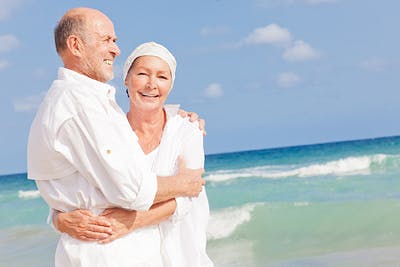
A diagnosis of cancer can feel like it has changed everything about your life. However, with some careful planning, a holiday can be a helpful part of dealing with the disease, and helping with your recovery. Cancer needn't be a barrier to travelling overseas, but bear some simple advice in mind when organising your trip.
Talk to Your GP ¶
- Check whether your chosen destination requires you to have immunisations or take malaria prophylaxis. If you are on immune suppressing medication, you may not be able to have these safely. There are options available, and your GP will be able to find the best solution for you.
Be prepared ¶
- Take a supply of your mediations with you, and keep some in your hand luggage so that if your bags got lost in transit, you wouldn't be without your medicines. Take a copy of your repeat prescription and the packaging from your medicines, in case you need replacements whilst abroad.
- Ask your GP for a print out of your medical records summary- and take a recent letter from your GP or hospital specialist summarising your diagnosis and treatments so far. If you do need medical attention overseas, this will be really helpful for the doctors looking after you.
- It is a good idea to take a letter from your GP detailing the medications you will need to carry with you and stating that you are fit to travel.
Where to go ¶
- Depending on your fitness level and symptom control, the world is your oyster! Consider how tired you may get, or whether a hot or cold environment may be uncomfortable. Also bear in mind how long it will take to get to your chosen destination- and how comfortable a plane seat may or may not be! Holidays at high altitude can make anyone feel breathless, so ensure you plan for this with appropriate acclimatisation time and sensible planning.
Staying healthy ¶
- Some cancer treatments reduce your immune response, making you more vulnerable to infections. Take care not to become dehydrated, which increases the risk of urine infections. If you damage your skin, make sure the wound is cleaned and covered. Drink bottled water and eat well cooked meat and peelable fruits- diarrhoea and vomiting can ruin your trip and may make you more unwell than usual. If you are particularly prone to certain infections or illnesses, speak to your GP and take some 'just in case' medicines with you — for example, dioralyte for an upset tummy, or antibiotics for urine or chest infections.
- If you are worried you are becoming unwell on holiday, make sure you see a doctor sooner rather than later- often early treatment can prevent you becoming more unwell.
- When travelling, ensure you stay mobile as much as you are able, walking around every hour to help prevent blood clots in the legs. If you find walking difficult, do some lower leg movements and ankle rotations as often as you can during your journey. Flight socks can be bought from most chemists, and these can also help to prevent clots.
Some careful planning before your trip can mean the holiday of a lifetime is possible. Talk to your GP or hospital specialist doctor about your plans, and you can plan sensibly to make you're your holiday goes smoothly.
Always consult your own doctor before travelling ¶
These travel tips are intended to provide general information for those with cancer and do not replace a visit to your doctor. If you are planning a holiday you should consult your doctor to ensure that you are fit to travel and discuss any specific health requirements you may have.
About Dr Handford ¶
Dr Ruth Handford is a GP with over 10 years' experience of working in both hospital and primary care. She is particularly interested in caring for the elderly in the community, child health, and family planning. Ruth lives and works in a rural community, and is kept very busy by her job and young family.
Important Information: These travel tips are intended to provide general information for those with cancer and do not replace a visit to your doctor. If you are planning a holiday you should consult your doctor to ensure that you are fit to travel and discuss any specific health requirements you may have.
Travel Insurance for cancer ¶
The Foreign and Commonwealth Office recommend that you have travel insurance in place every time you travel abroad. Make sure that your travel insurance covers any medical conditions you may have.
Goodtogoinsurance.com is proud to be able to provide cover for all types of cancer, including breast cancer, lung cancer, prostate cancer and bowel cancer.
